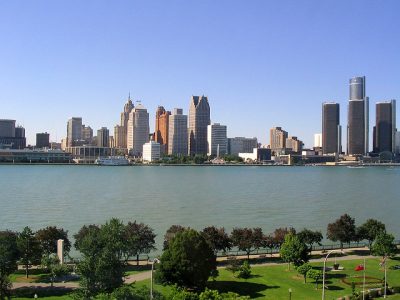Employment and Wages

Immigrant Entrepreneurs Help Build U.S. Economy One Company at a Time
Google, Intel, eBay, Yahoo!, Facebook, LinkedIn, SanDisk, Altera, Zoosk, Etsy, Tesla Motors. What characteristic does each of these well-known companies share? They each were either founded by an immigrant or have at least one immigrant founder. Now, a new report from the National Venture Capital Association highlights the profound impacts that immigrant entrepreneurs—like the immigrants who helped to found major U.S. corporations—have on our economy. Immigrant entrepreneurs start companies throughout America in many different industries, creating value and new jobs in the United States, and advancing U.S. innovation. Read More

New Study Shows How Native-Born Workers Benefit from Immigration
One of the fears recurrently raised by those who oppose immigration is that inflows of immigrants negatively affect the native-born labor force in general, and less-educated working class individuals in particular. The idea upon which this assertion relies is that when less-educated workers immigrate into the host country, they systematically bring down the wages of similarly educated native-born workers. This notion is oftentimes overstated and is to a large extent fueled by prejudice rather than being backed by hard evidence. Read More

Immigration Reform Will Help Address Critical Lack of Medical Doctors
The U.S. faces a severe shortage of physicians, particularly in primary care and in rural areas, and as baby boomers retire, the U.S. workforce will need many more health professionals to fill their spots in the health care field. But many hurdles prevent foreign doctors, who are just as qualified as their U.S. counterparts, from working in the United States and filling this urgent need. These obstacles include redundant licensing requirements, which require another residency in the U.S. even if one was already completed abroad, and an exceptionally expensive and complex immigration process. “It took me double the time I thought, since I was still having to work while I was studying to pay for the visa, which was very expensive,” said Alisson Sombredero, an H.I.V. specialist who came to the U.S. from Colombia in 2005, in The New York Times. Read More

Forging Consensus on Visa Program Critical to Crafting Effective Policy
A proposal being considered in the House revives the debate around the number of visas that would be allocated to less skilled workers, also known as “W” visas. In particular, Representatives Ted Poe of Texas and Raul Labrador of Idaho are working on an immigration bill that could double the number of visas of less skilled workers that the Senate settled on. Although the increased number could help address the labor shortage in some industries, this proposal would potentially cause a fracture in the consensus achieved between business and labor leaders who negotiated the levels that were included in S. 744. Ultimately, what is critical to success of a program depends on having the right players at the table ensuring both private and public interests are protected. Read More

How States And Local Economies Benefit From Immigrants
Detroit usurped Jefferson County, Alabama’s place last week as the largest municipality in the United States ever to file for bankruptcy. And as signs increasingly pointed toward the city’s financial issues, local leaders in Southeast Michigan have been exploring ways in which to stabilize or strengthen Detroit’s economy. One way to do that is to encourage more immigrants to settle there. New restaurants, shops, and residents already have helped to revitalize one area in Southwest Detroit called Mexicantown. And there is no doubt that immigrant entrepreneurs and innovators play an important role throughout Michigan as well. Immigrant entrepreneurs create jobs, bring in additional revenue, and contribute significantly to the state’s economy. Highly skilled immigrants are vital to the state’s innovation activities, spurring further growth. As such, local leaders and advocates recognize the importance of immigrants in their communities and support immigration through local “welcoming” and integration initiatives. Read More

Immigrants are Key Driver of U.S. Talent and Economic Competitiveness
U.S. workers in science, technology, engineering, and mathematics (STEM) fields have been important contributors to American innovation, job creation, rising incomes, and global economic competitiveness throughout the years. And not surprisingly, immigrants have played a critical role in American innovation through STEM fields and all parts of the U.S. economy. A new report by Gordon Hanson (University of California, San Diego) and Matthew Slaughter (Dartmouth) describes these important relationships between talent, economic competitiveness, and immigration in the United States. In their paper, the authors present data in support of three critical points: Read More

Immigrants Boost Economic Vitality through the Housing Market
Abundant research shows that immigration is a net benefit to the United States’ economy. It leads to higher wages, business formation, job creation, and greater innovation – nationally and locally. Foreign workers who immigrate to the U.S. help alleviate labor force gaps left by a workforce increasingly nearing and entering retirement age. Furthermore, immigrants help fulfill growing healthcare needs of an aging population. In addition to these positive benefits of immigration, the favorable effect immigrant home-buyers have on the housing market is another important economic impact. Indeed, new research from the Americas Society/Council of the Americas and the Partnership for a New American Economy describes how the 40 million immigrants residing in the United States added $3.7 trillion to housing wealth in the U.S. The research, prepared by Jacob Vigdor at Duke University, uses county-level data on population and housing from the U.S. Census Bureau and American Community Survey from 1970 to 2010. The results show that immigration led to a boost in home values, particularly in neighborhoods hit hardest by the U.S. housing bust. Read More

Immigrants and Their Children Fill Gaps Left by Aging American Workforce
Over the next two decades, as the baby boom generation continues entering retirement, we will experience the largest exodus from the workforce by any generational cohort in American history. This wave of retirees will create a labor force deficit among the millions of jobs baby boomers depart from on top of new job growth industries create. Amid this great demographic shift, immigrants and their children are poised to play a critical role in filling workforce gaps left by massive baby boom generation retirements over the next twenty years, as a new forward-looking report from the Center for American Progress describes. Read More

Busting the Myth of the “Job Stealing” Immigrant
Some critics of the immigration bill now winding its way through the Senate claim that it would increase unemployment among native-born workers—especially minorities—by adding more immigrants to an already tight job market. In fact, both the legalization and “future flow” provisions of the bill would empower immigrant workers to spend more, invest more, and pay more in taxes—all of which would create new jobs. Contrary to the simplistic arithmetic of immigration restrictionists, employment is not a “zero sum” game in which workers compete for some fixed number of jobs. All workers are also consumers, taxpayers, and—in many cases—entrepreneurs who engage in job-creating economic activity every day. Read More

The Economic Blame Game: Immigration and Unemployment
One of the most persistent myths about the economics of immigration is that every immigrant added to the U.S. labor force amounts to a job lost by a native-born worker, or that every job loss for a native-born worker is evidence that there is need for one less immigrant worker. However, this is not how labor-force dynamics work in the real world. The notion that unemployed natives could simply be “swapped” for employed immigrants is not economically valid. In reality, native workers and immigrant workers are not easily interchangeable. Even if unemployed native workers were willing to travel across the country or take jobs for which they are overqualified, that is hardly a long-term strategy for economic recovery. There is no direct correlation between immigration and unemployment. Read More
Make a contribution
Make a direct impact on the lives of immigrants.
